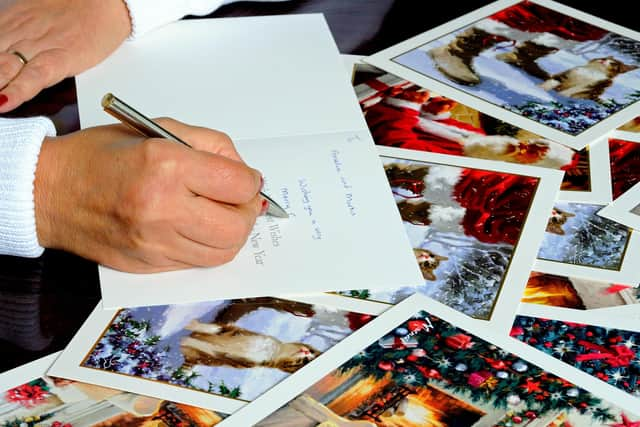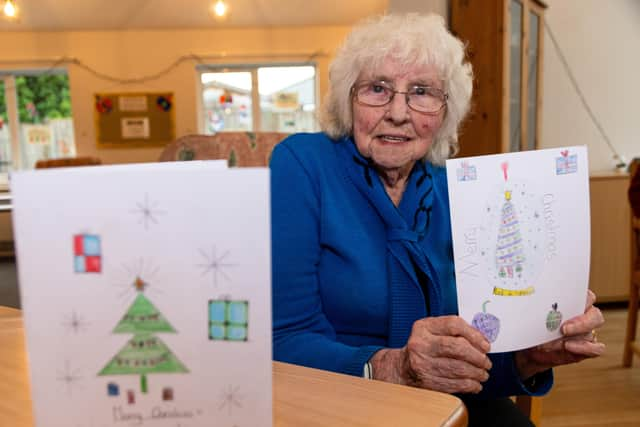Why Christmas cards matter as children embrace this tradition – Jayne Dowle
Now, however, thanks to the painful experience of separation we are experiencing, this Victorian invention is suddenly – and happily – back in fashion.
A YouGov survey commissioned by Royal Mail reported that 55 per cent of people think that sending Christmas cards is more important than ever amid the pandemic.
Advertisement
Hide AdAdvertisement
Hide AdAnd, as millions of us face a Christmas under strict Tier 3 restrictions despite Matt Hancock’s misleading hints last week that Leeds could drop down to Tier 2, really, what else is there to do but sit and write cards?


Most other connective Christmas traditions are frankly, off. No pub. No church services, or only socially-distanced ones at best. No parties, or get-together lunches or festive drinks after work. In our little party of four, we are taking a walk on Boxing Day, but will be appreciating the natural beauty on our doorstep rather than setting off to the coast.
I don’t fancy a run-in with a traffic officer ruining my Christmas break. And how irresponsible and selfish would it be, really? I still can’t believe how many people I talk to who don’t think the rules apply to them. I’ve heard individuals planning cross-country expeditions just to stand outside a house and drop off a bunch of presents. Haven’t these people heard of Royal Mail or Hermes?
I’m the first one to question any kind of authority, but this year I’m not only listening to the (reputable) science but also thinking of the friends and family who have suffered badly with the virus or lost a loved one.
Advertisement
Hide AdAdvertisement
Hide AdThose who can’t face the idea of a different Christmas this year are guilty of a massive failure of imagination. There are ways to celebrate this festival without getting together in person, and Christmas cards are helping to fill the gap.


After all, what is more important? Cuddling up to granny under the mistletoe, or not having her here next year to give a card to at all? If this recalibration of priorities is part of the ‘‘Great Re-set’’ then let’s at least celebrate the positive outcomes.
Three-quarters of adults believe that sending a Christmas card is a more meaningful way of letting loved ones know you are thinking of them than a social media message or text. Either that or we’re all heartily sick of Zoom meetings and awkward ‘‘hellos’’ over a Facetime connection that keeps dropping out.
I’d argue that this resurgence in old-fashioned Christmas card sending has much to do with the respect we’ve developed for the older generation this year; everyone can read a card, or have it read to them in a hospital or care home, whilst phones, laptops and tablets can be baffling and even distressing for some elderly or vulnerable people. Technology can also be insular; it’s much nicer to be able to display a greeting than look at it on a screen.
Advertisement
Hide AdAdvertisement
Hide AdCharities and independent retailers are reporting rocketing demand both for packs of Christmas cards and individual ‘‘family’’ cards. Mothers and grandmothers all over Yorkshire have always appreciated the ones with a ‘‘nice verse’’ of course.


Interestingly, it’s younger people leading the charge, with 15 per cent of 18 to 24-year-olds planning to send more cards this year according to Royal Mail research.
As well as making us feel more connected, charities are receiving a much-needed boost to their coffers. Save The Children says it has seen a 1,000 per cent increase in sales since last year, and at the British Heart Foundation reports sales to be 600 per cent higher.
Here in Barnsley, of course, we’re always on the cutting edge of the zeitgeist. I began to sniff change in the frosty air at the very beginning of December, when cards started to arrive from people whom I thought had given up the tradition in favour of sponsoring a Sudanese donkey.
Advertisement
Hide AdAdvertisement
Hide AdThis year, when we’ve all been forced to think of those less fortunate than ourselves, no moral high ground is achieved by this stance. In fact, it rings more hollow than ever.
I don’t want to know that your family has decided not to send cards this year. It would give me a much nicer feeling to learn that you’d donated some decent presents to your local toy collection, given a bag of shopping to the foodbank and still managed to scrape together 99p for a pack of 10 from any local card retailer.
Apparently, retailers including independent businesses and retail giant Moonpig quickly cashed in on the Prime Minister’s advice to be ‘‘jolly careful’’, creating Christmas card designs with the PM giving the thumbs-up backed by a Union Jack. I wouldn’t send one of those to my worst enemy, but I’ll be taking the sentiment to heart.
Support The Yorkshire Post and become a subscriber today. Your subscription will help us to continue to bring quality news to the people of Yorkshire. In return, you’ll see fewer ads on site, get free access to our app and receive exclusive members-only offers. Click here to subscribe.
Comment Guidelines
National World encourages reader discussion on our stories. User feedback, insights and back-and-forth exchanges add a rich layer of context to reporting. Please review our Community Guidelines before commenting.